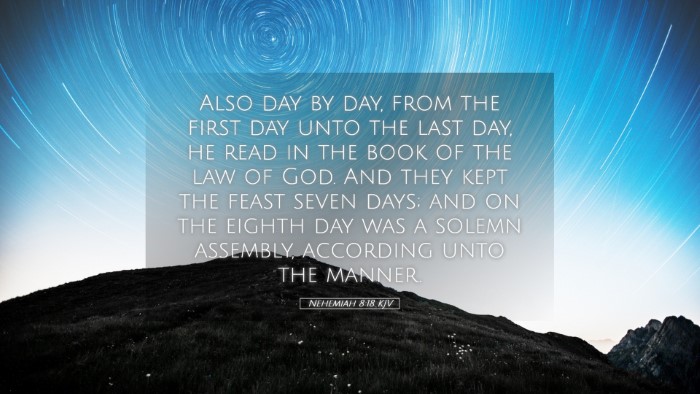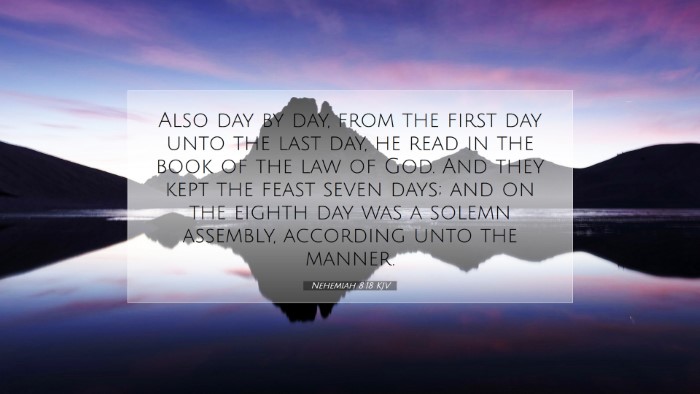Old Testament
Genesis Exodus Leviticus Numbers Deuteronomy Joshua Judges Ruth 1 Samuel 2 Samuel 1 Kings 2 Kings 1 Chronicles 2 Chronicles Ezra Nehemiah Esther Job Psalms Proverbs Ecclesiastes Song of Solomon Isaiah Jeremiah Lamentations Ezekiel Daniel Hosea Joel Amos Obadiah Jonah Micah Nahum Habakkuk Zephaniah Haggai Zechariah MalachiNehemiah 8:18
Nehemiah 8:18 KJV
Also day by day, from the first day unto the last day, he read in the book of the law of God. And they kept the feast seven days; and on the eighth day was a solemn assembly, according unto the manner.
Nehemiah 8:18 Bible Commentary
Commentary on Nehemiah 8:18
Nehemiah 8:18 reads: "Also day by day, from the first day unto the last day, he read in the book of the law of God. And they kept the feast seven days; and on the eighth day was a solemn assembly, according unto the manner."
Summary of Context
The verse finds its place within a powerful moment of renewal and dedication for the people of Israel. After returning from Babylonian exile, they rediscover the importance of the Law as expounded by Ezra, which led to a profound revival among the people of Jerusalem. The reading of the Law instigated a desire for reform and restoration in their covenant relationship with God.
Insights from Public Domain Commentaries
1. Matthew Henry's Commentary
Matthew Henry highlights the centrality of the Word of God in the lives of the Israelites at this moment. He notes:
- Continuous Reading: The repeated reading of the book of the law indicates a profound commitment to retention and understanding. It also signifies the gradual revelation of God’s will through scripture.
- Spiritual Feasting: The observance of the feast for seven days symbolizes both joy and reflection upon God's past mercies and present faithfulness. This aligns with the cultural practice of celebrating harvest, fittingly inaugurating a new beginning for the community.
- Solemn Assembly: The solemn assembly on the eighth day signifies a withdrawal from ordinary routines into sacred reflection. It marks a commitment to obedience and communal worship.
2. Albert Barnes' Notes
Albert Barnes contributes significant observations that delve into the implications of this text:
- Systematic Approach: He observes that the systematic reading each day reinforces the importance of the Law and establishes a ritual that prioritizes scripture in everyday life.
- Liturgical Significance: Barnes emphasizes the liturgical implications of the feast. The prescribed duration of seven days aligns with God's creation pattern—each day of the feast serves as a reflection of divine order and grace.
- Emphasis on Assembly: The spiritual consolidation in communal gatherings stresses the importance of unity among believers. The gathering serves to solidify the collective commitment to God’s covenant.
3. Adam Clarke's Commentary
Adam Clarke offers a detailed examination of the historical and theological dimensions of the feast:
- Reformation Through Scripture: Clarke acknowledges that the reading of the Law instigated personal and communal reformation, touching hearts and renewing the covenantal consciousness among the people.
- Symbolism of the Eighth Day: He points out the significance of the eighth day, as it symbolizes a new beginning. In Jewish tradition, the eighth day often suggests a fresh start, highlighting the transition from the old covenant to a renewed relationship with God.
- Joyful Celebration: Clarke reflects upon the atmosphere of joy that infused this gathering. Joy in the Lord forms the essence of their worship and is an acknowledgment of the gifts of grace bestowed upon them.
Theological Reflections
This verse encapsulates not only a moment of historical importance but also offers rich theological implications:
- Authority of Scripture: The act of reading the Law continually reaffirms the authority of scripture in the life of believers. It establishes that spiritual renewal is rooted in the understanding and application of God's Word.
- Continual Growth: The pattern of daily reading suggests a model for continual growth and engagement with scripture, encouraging pastors and leaders to foster an environment where scripture is central in communal life.
- Community and Worship: The gathering serves to emphasize the collective nature of faith. Individual faith should reflect a corporate responsibility towards worship, teaching, and edification in the body of Christ.
Application for Modern Believers
For today’s pastors, students, theologians, and scholars, Nehemiah 8:18 serves as a powerful reminder of the priority of God’s Word in ministry and church life:
- Foundation for Worship: Incorporating regular scripture reading into communal worship fosters an environment where God’s presence is actively acknowledged and celebrated.
- Commitment to Teaching: The significance of Ezra's role as a teacher challenges modern church leaders to commit themselves to teaching and explaining the scriptures accurately and passionately.
- Cultivating Joy: The emphasis on joy highlights the need for worship to embody gratitude and recognition of God's grace, promoting an atmosphere that encourages celebration within the body.
Conclusion
Nehemiah 8:18 serves as an eloquent testament to the power of God's Word and the collective response of His people. The enduring legacy of this verse is reflected in its call to continuous learning, communal worship, and joyful obedience. As scholars and ministers engage with scripture, may they find inspiration in the practices of ancient Israel, leading to a vibrant and renewing faith community today.


